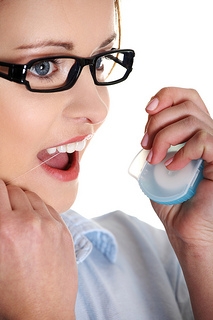October is National Dental Hygiene Month: A simple oral health routine for your busy lifestyle
October 5th, 2016

Adults are no strangers to feeling like there is never enough time in the day to get everything done. Your alarm clock rings and within minutes you ping pong around trying to spread peanut butter on sandwiches, answer your cell phone, remove the dog hair from your clothes, and make sure your child has completed his or her science fair project. Brushing your teeth can easily fall to the wayside. That is why our office promotes a simple, daily oral health regimen that you can easily incorporate into your busy lifestyle.
The American Dental Hygienists' Association (ADHA), in partnership with the Wrigley Jr. Company, is celebrating National Dental Hygiene Month (NDHM) during October. The ADHA encourages people to "Brush. Floss. Rinse. Chew...Keep it Clean, Keep it Healthy!" and offers some great tips for a quick and effective home oral health routine, below:
Oral Health Routine at Home
- Brushing your teeth twice daily is the most important thing you can do to diminish the accumulation of plaque and the potential for other oral problems such as cavities and gingivitis.
- Flossing once daily removes plaque and food from beneath the gums and between teeth that brushing alone cannot remove. Tooth decay and gum disease often begin in these areas.
- Rinsing your mouth with an antibacterial, non-alcohol based mouthwash kills plaque and gingivitis germs that brushing and flossing do not catch. We recommend using a mouthwash with the ADA Seal of Acceptance.
- Chewing sugar-free gum helps produce saliva, which battles cavities. The gum also neutralizes plaque, strengthens enamel, and removes remaining food. It is especially important to chew gum after eating or drinking.
It's easy to put the toothbrush down in order to take care of matters you feel are more urgent, but remember, a good oral health routine at home is the best way to prevent periodontal disease. "Periodontal disease is the most common cause of tooth loss in adults. An estimated 75 percent of Americans reportedly have some form of periodontal disease," said the ADHA. Periodontal disease also is linked to more serious illnesses such as diabetes and stroke.
Also, remember to keep regular visits with our office. Dr. Tom Nymberg can help you learn more about proper care for your teeth and gums.






